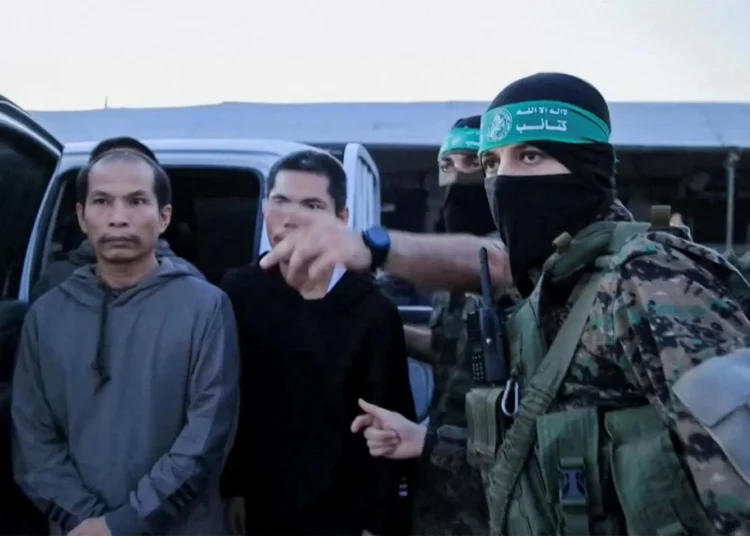Levent Kenez/Stockholm
Following the declaration of a temporary ceasefire between Israel and Hamas, among the hostages released were 17 Thai nationals. Turkish media, closely aligned with the government, reports that President Recep Tayyip Erdogan played a leading role in the release of the Thai citizens who were abducted by Hamas on January 7. However, there is no official acknowledgment from Thai authorities or the Turkish Foreign Ministry regarding Turkey’s role in the release of these hostages. Turkey was not among the countries thanked by Thailand for their assistance in the matter.
24 TV, funded by the Erdogan government, reported on November 27 that President Erdogan instructed the National Intelligence Organization (MİT) to intervene for the release of Thai captives in Gaza. Following negotiations, Hamas released 17 Thai nationals. The latest development highlighted Erdogan’s leading role in peace diplomacy once again, according to the information presented in the news.
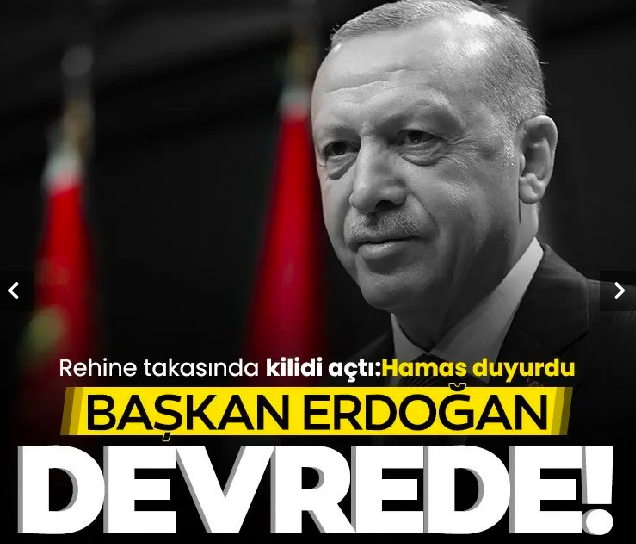
The Turkuvaz Media Group, owned by the Erdogan family, is also reporting in its broadcasts that Erdogan played a pivotal role in the release of the Thai hostages. The coverage suggests that Erdogan initiated the efforts, leading to what Turkuvaz claimed was the “rescue of the hostages by MİT.”
According to a news story dated November 28 in the Sabah daily, part of the Turkuvaz Media Group, İbrahim Kalın, the head of MİT, conducted four critical meetings with Hamas over a period of six weeks. These meetings took place in Doha, Ankara and Istanbul. In the initial discussions, Hamas was urged to release civilian hostages, with the understanding that such a move would facilitate the efforts of concerned states, particularly Turkey, in achieving a lasting ceasefire and providing humanitarian aid, the story claims.
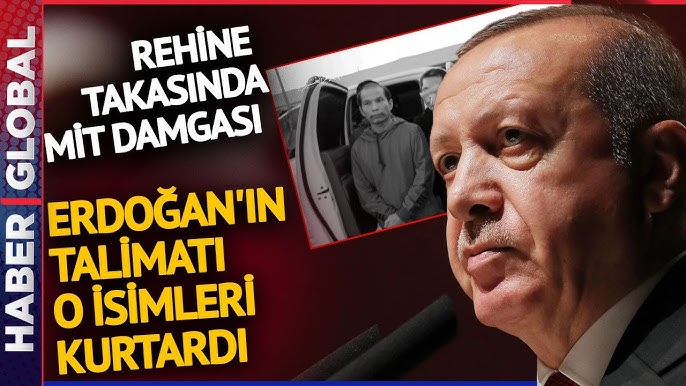
As part of these efforts, face-to-face meetings were held with Hamas’s political bureau chief İsmael Haniyeh in Qatar. Turkey’s ambassador in Doha, under the directive of Foreign Minister Hakan Fidan, also participated. Ankara directly conveyed information received from countries officially requesting the rescue of their citizens to the political leaders of Hamas. Through Hamas’s internal communication channels, Ankara ensured the inclusion of not only Israeli citizens but also citizens of third-party countries, Sabah reports.
Hamas announced on November 26 that they had finalized the release of Thai hostages in Gaza, attributing the efforts to Turkish President Tayyip Erdogan, as stated in their official announcement.
“In response to the endeavors of Turkish President Recep Tayyip Erdogan, the Islamic Resistance Movement Hamas has successfully completed the release of Thai detainees within the Gaza Strip,” the statement read.
The statement from Hamas does not specify whether it refers to all 17 Thai hostages released or only the three hostages released later.
Indeed, it is noteworthy that until Hamas issued its statement, there had been no coverage in the Turkish media regarding Turkey’s role in the release of the first Thai hostages who were freed on November 24. If Turkey had been involved in efforts to secure the release of these hostages for an extended period of time, it would be expected that pro-government media outlets affiliated with Turkish intelligence would report on Erdogan’s role in the matter without waiting for Hamas’s statement.
So it is likely that Hamas issued such a statement to underscore Erdogan’s robust support for the group, with the intention of giving him credit for rescuing the hostages.
Additionally, it is possible that the Turkish side, in exchange for its support for Hamas, might have sought to have this statement released.
Another development that has increased suspicions about the exaggeration of Turkey’s role in the release of the hostages is the statement from Thai authorities.
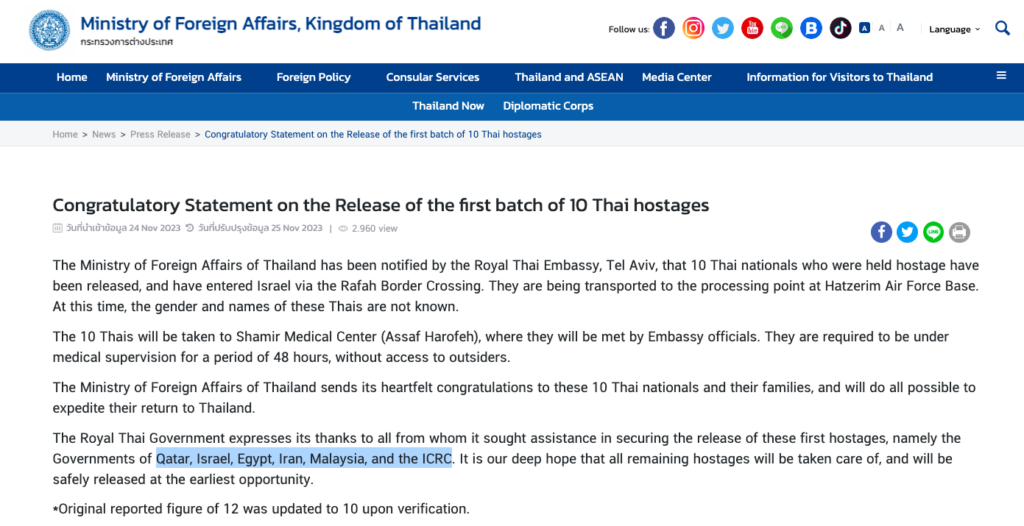
The Thai Ministry of Foreign Affairs expressed its gratitude in a statement, saying, “The Royal Thai Government expresses its thanks to all from whom it sought assistance in securing the release of these first hostages, namely the Governments of Qatar, Israel, Egypt, Iran, Malaysia, and the ICRC [International Committee of the Red Cross]. It is our deep hope that all remaining hostages will be taken care of and will be safely released at the earliest opportunity.”
It was publicly disclosed that Iran had established communication with Hamas regarding the rescue of the Thai hostages. Iranian authorities had shared photographs with their Thai counterparts confirming the well-being of the Thai hostages.
Asked about Iran’s claim, a Thai foreign ministry spokesperson said on Saturday that “we have provided lists since the beginning to everyone,” including Qatar, Egypt, Israel and Iran,” adding “Different actors would have different influence on Hamas.”
On November 24, as reported by Reuters, some 12 Thai hostages were released in a separate agreement mediated by Qatar and Egypt with Hamas. According to an official briefed on the talks, the released hostages, all of whom were men, were not covered by the truce deal with Israel, which specifically pertains to women and children. This separate negotiation track was initiated during the Thai foreign minister’s visit to Qatar on October 31, resulting in a specific agreement with Hamas for the release of the Thai hostages.
Meanwhile, a Thai Muslim group that directly engaged with Hamas claimed that its efforts had played a crucial role in ensuring that Thai hostages were among the first to be released in Gaza during a temporary truce with Israeli forces.
Lerpong Syed, the president of the Thai-Iran Alumni Association, told Reuters on Monday, “We were the sole party that spoke to Hamas since the beginning of the war to ask for the release of Thais.”
It appears that various parties are claiming involvement in the release of hostages. However, contrary to the coverage in the Turkish media, neither the presidency nor the Turkish Ministry of Foreign Affairs has made any official statements so far regarding the hostages released or Turkey’s role in the matter.
Last month journalists close to the government had reported that Erdogan had been involved in efforts to secure the release of hostages. However, it was particularly emphasized that leveraging his special relations with Qatar, Erdogan aimed to receive global acclaim by orchestrating the rescue of Israeli hostages.
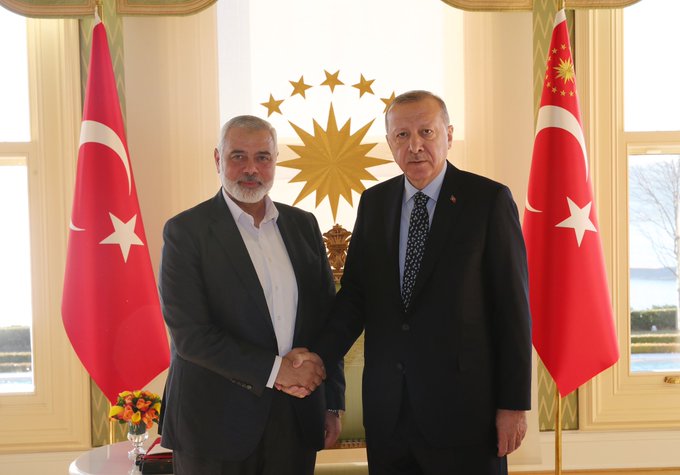
Nordic Monitor previously reported that in the initial stages of the conflict, Erdogan had called for restraint from both sides, presenting a departure from his previous strong statements about Israel. Erdogan immediately called Israeli President Isaac Herzog to convey his condolences for the loss of life among Israelis. However, when this approach failed to garner the anticipated attention and he faced challenges in maintaining his balanced stance due to the intense Israeli military operation in Gaza and the resulting civilian casualties, triggering reactions within his political base, Erdogan later issued strong remarks regarding Israel’s extensive military operations, which have also reportedly killed thousands of civilians along with Hamas militants.
He described Hamas as a liberation group engaged in a battle to protect its lands and people, rejecting the characterization of it as a terrorist group.

